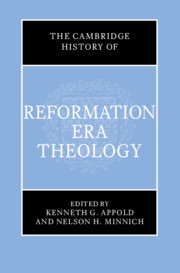Book contents
- The Cambridge History of Reformation-Era Theology
- The Cambridge History of Reformation-Era Theology
- Copyright page
- Contents
- Figures
- Acknowledgments
- Contributors
- Abbreviations
- Introduction
- Part One Theology in an Age of Cultural Transformation
- Part Two Schools and Emerging Cultures of Theology: Diversity and Conformity within Confessions
- Part Three Topics and Disciplines of Theology
- 21 Method and Ethos of Theological Instruction and Discourse
- 22 Biblical Theology
- 23 Systematic Theology
- 24 Controversial Theology
- 25 Sacramental and Liturgical Theology
- 26 Pastoral Theology and Preaching
- 27 Reformation Ethics and Moral Theology
- 28 Ecclesiastical Law in Early Modern Europe
- 29 Spirituality in the Reformation Era (1500–1675)
- 30 Catholic Christianity and Indigenous Religions in the Americas
- 31 Jesuit Catechisms in Japan and India
- 32 Theology in China ca. 1582–ca. 1688
- 33 Theology and Science
- 34 Theology and History
- 35 Theology, Politics, and Warfare
- 36 The Role of Art in the Theological Discourse of the Reformation
- Index
- References
28 - Ecclesiastical Law in Early Modern Europe
from Part Three - Topics and Disciplines of Theology
Published online by Cambridge University Press: 27 September 2023
- The Cambridge History of Reformation-Era Theology
- The Cambridge History of Reformation-Era Theology
- Copyright page
- Contents
- Figures
- Acknowledgments
- Contributors
- Abbreviations
- Introduction
- Part One Theology in an Age of Cultural Transformation
- Part Two Schools and Emerging Cultures of Theology: Diversity and Conformity within Confessions
- Part Three Topics and Disciplines of Theology
- 21 Method and Ethos of Theological Instruction and Discourse
- 22 Biblical Theology
- 23 Systematic Theology
- 24 Controversial Theology
- 25 Sacramental and Liturgical Theology
- 26 Pastoral Theology and Preaching
- 27 Reformation Ethics and Moral Theology
- 28 Ecclesiastical Law in Early Modern Europe
- 29 Spirituality in the Reformation Era (1500–1675)
- 30 Catholic Christianity and Indigenous Religions in the Americas
- 31 Jesuit Catechisms in Japan and India
- 32 Theology in China ca. 1582–ca. 1688
- 33 Theology and Science
- 34 Theology and History
- 35 Theology, Politics, and Warfare
- 36 The Role of Art in the Theological Discourse of the Reformation
- Index
- References
Summary
The sixteenth and seventeenth centuries saw significant changes in Roman canon law. The libri legales that were taught in the law schools and used in the courts had been compiled in the thirteenth and fourteenth centuries. After the first half of the fourteenth century popes no longer attempted to shape papal law. After the middle of the fourteenth century the bishops of Rome did not promulgate any more collections of papal court decisions (decretals). They left the development of canonical jurisprudence to the jurists. Together with the Justinian codification of Roman law these libri legales formed the “required books” for every European law-school class.1
- Type
- Chapter
- Information
- The Cambridge History of Reformation Era Theology , pp. 579 - 603Publisher: Cambridge University PressPrint publication year: 2023



